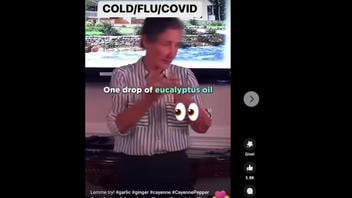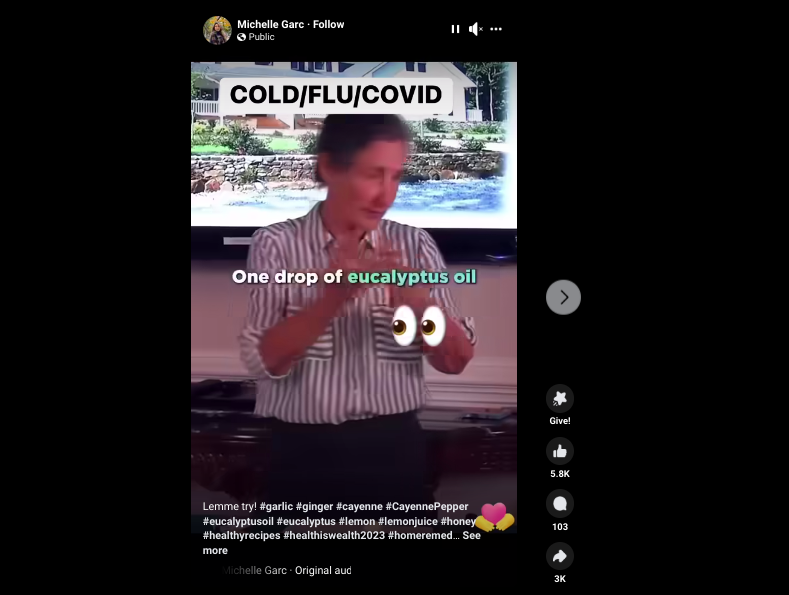
Does consuming an "expanded lemon and honey drink" that contains several herbal ingredients cure COVID-19? No, that's not true: At the time of writing, there is no known cure for COVID, along with other common illnesses like the cold or the flu. Furthermore, alternative treatments have not been shown to treat COVID effectively.
The claim appeared in a reel (archived here) on Facebook on December 24, 2023. The reel showed an unnamed person, who said:
So we're looking at the six ingredients. So we've got garlic and ginger, one drop of eucalyptus oil, and cayenne pepper as much as you dare. Some can handle a sprinkle, some can handle half a teaspoon. So there's four ingredients, the last two ingredients are the juice of a lemon and a teaspoon of honey. So it's a really expanded lemon and honey drink that many people have taken for colds. And then you add about half a cup of water. So if you feel a cold coming on, flu, any respiratory, of course, what's all the go at the moment is COVID, and you take a flu bomb three times a day and it'll be gone in three days. Of course at the same time you've got to exercise and drink all your water and eat very lightly.
This is what the post looked like on Facebook at the time of writing:
(Source: Facebook screenshot taken on Wed Jan 3 16:19:33 2024 UTC)
A 'cure' is just an outcome of a treatment
Claiming that there is a "cure" for an illness is different than suggesting a treatment that can help alleviate symptoms of an illness. Cleveland Clinic defines what it means to be cured (archived here):
Being cured of a disease means it's completely gone and isn't coming back. For many people, cures represent the ultimate treatment goal. Most diseases and conditions aren't curable. Still, this doesn't mean treatments can't provide good health and the peace of mind that goes along with them.
The resource elaborates:
Treatments include medicines, procedures and therapies to improve your health and well-being. A cure is one potential treatment outcome that can lead to these improvements. Other treatment outcomes may also keep you healthy and allow you to live the life you want. ...
Cure: Gets rid of your disease or illness for good. For example, antibiotics can clear a bacterial infection. Antibiotics can't prevent future infections if you're exposed to new bacteria. But they can eliminate the particular bacteria causing your current infection.
No COVID cure
According to Mayo Clinic (archived here), there is no known cure for COVID. The World Health Organization (archived here), the Centers for Disease Control and Prevention (archived here) and the National Institutes of Health (archived here) have published guidelines for treating COVID. All the agencies note that those with mild COVID symptoms can take over-the-counter medications for some relief. Still, these medications will not guarantee that COVID will disappear.
No cure for the common cold or the flu
As for the claim that such a drink will also cure the common cold and the flu, there is no evidence indicating that, either. There is no cure for the cold, according to the CDC (archived here) and John Hopkins Medicine (archived here). However, as both note in their resources, some treatments have been proven to help alleviate symptoms, including drinking fluids and taking over-the-counter medications.
Similarly, there is no cure for the flu. However, antiviral drugs may shorten the duration of flu symptoms (archived here).
The 2024 CDC Yellow Book, which compiles health information relevant to international travel, addresses claims about integrative and complementary treatments for the cold and the flu (archived here), including garlic and other herbs:
No strong evidence supports claims that garlic, Chinese herbs, oil of oregano, or eucalyptus essential oil prevent or treat colds, or that the homeopathic product Oscillococcinum prevents or treats influenza or influenza-like illness.
COVID claims
Lead Stories reached out to the National Institute of Allergy and Infectious Diseases for comment on this claim. We will update this story with any relevant response.
More Lead Stories fact checks related to the coronavirus pandemic and COVID can be found here.


















